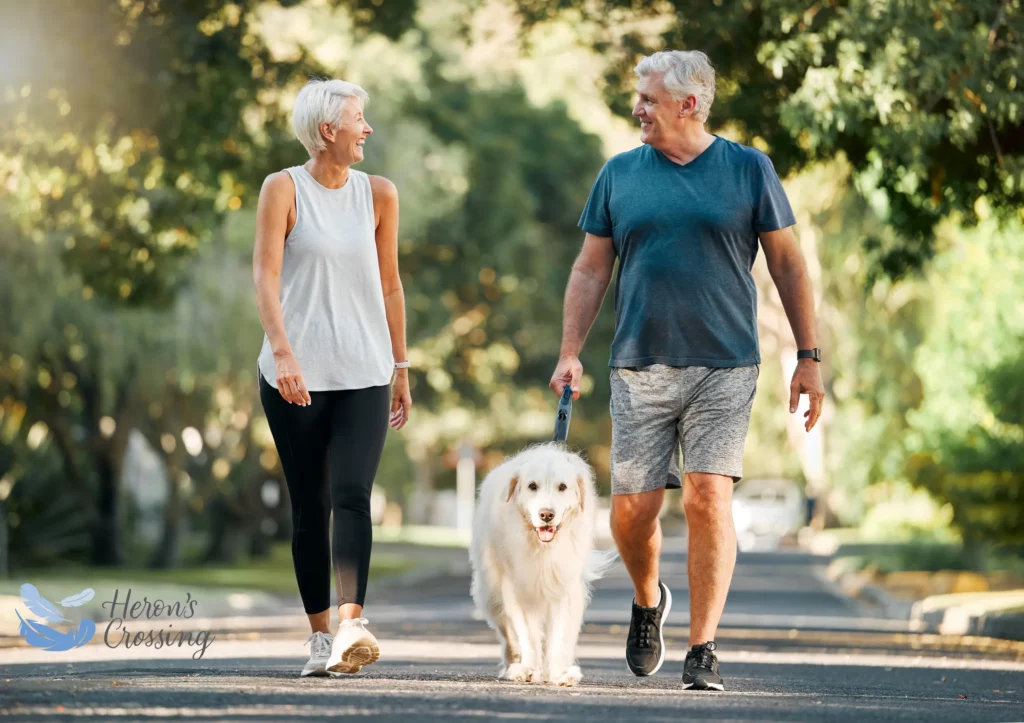Have you considered that your graying dog needs you more than ever as he ages? His vision is not what it used to be, nor is his hearing. He can’t run or defend himself well anymore. He needs someone who will look out for him.
His old bones may hurt. He may have arthritis or hip dysplasia, and his gait may be unstable as his muscles weaken. Those muscles include his heart. If he is left in the backyard alone, chances are he will mostly find a sunny spot and lay down. Yet your senior dog still needs some daily exercise to keep him flexible, to help his circulation, and to keep his muscles from wasting away.
First, have your vet determine what his limits are, and what particular challenges he faces. Then you can start planning a simple senior walk routine. Possibly, you can also help him by adding joint supplements to his meals, or changing his diet to help him lose weight, so he has less to carry.
Just as runners prepare for exercise, you may want to help your elderly dog loosen up for his morning outing with a very gentle back rub and checking of the legs and paws. Some dogs love this special attention.
Walk leash-free with him in the backyard or at a dog park that is large enough to accommodate slow dogs as well as the frisky ones. Perhaps there is an area set aside for senior pets. To keep his mind active, point out items of interest, and encourage him to socialize with gentle dogs.
When leash-walking, go at his pace, not yours. Choose soft surfaces such as grass or sand that will be much more gentle on his foot pads, and cushion his steps. Gravel, acorns, pinecones, pine bark chips and rough, uneven ground can cause problems. There are orthopedic shoes, simple protective booties, and even sandals for dogs that you may want to look into as a help.
Never force him to walk, especially when it’s too hot, too cold or rainy. If he has to be out in bad weather, a sweater or raincoat is necessary. Snow boots, too, are a must for winter. Older animals can’t take the cold very well because their hearts have to pump harder to keep the body warm. In summer months, take your walks in the early morning, to keep him from panting and overheating. Keep him as weather-comfortable as possible to help his heart, lungs and legs work at their best.
This is also a good time to assess your dog’s limitations in action. Did he hear that car? Did he miss seeing the squirrel, or is he unable to smell it? Does he seem to look confused or forgetful at times? Does he stumble occasionally? Watch more closely to see if you can discover why. Watch for signs that he is becoming breathless, overheated or tired.
Never force your dog to walk, but if you can encourage him to take a couple of steps outside for some fresh air, you may see a little more improvement each day. Make his walks much shorter, but perhaps more frequent. You may want to invest in a wagon, or a stroller for a small dog, to extend fresh air time even when he is tired or not feeling as well.
Wherever you go, bring water and stop for rest frequently. After your outing, make sure he has a comfortable bed to nap in, tucked into a quiet corner, with his water bowl close by.
Yes, it will require more work, but your old friend will benefit so much from your loving attention.
Heron’s Crossing provides end-of-life care for pets in the Metro Atlanta area. In-home appointments with compassionate vets are available. If you’d prefer a home-like setting away from your home, our Decatur office is also available by appointment.

